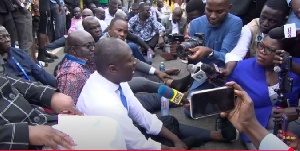- Home - News
- Elections 2024
- News Archive
- Crime & Punishment
- Politics
- Regional
- Editorial
- Health
- Ghanaians Abroad
- Tabloid
- Africa
- Religion
- Photo Archives
- Press Release
General News of Sunday, 1 June 2025
Source: www.ghanawebbers.com
When lawmakers themselves appear unwilling to abide by the laws they legislate
Justice, equality, and fairness are essential for a functioning democracy. A just society treats all individuals equally, regardless of their status.
The saying "People who live in glass houses shouldn't throw stones" warns against hypocrisy. Lawyer Andy Appiah-Kubi explains that those with flaws should not criticize others.
The arrest of Bernard Antwi Boasiako, known as Chairman Wontumi, has sparked debate in Ghana. He is the Ashanti Regional Chairman of the ruling New Patriotic Party (NPP). Protests led by the Minority Caucus raise questions about accountability and political influence on justice.
Wontumi faces accusations of financial irregularities, including fraud and money laundering. These investigations may connect to a larger international crime scheme. Under Ghanaian law, serious crimes require accountability to maintain public trust.
Accountability is crucial in any democracy. Leaders must answer for their actions and decisions. Should party leaders support someone facing serious allegations simply because he represents their party? Public trust relies on allowing due process without interference.
The protests by Minority MPs supporting Wontumi show both solidarity and troubling aspects of politics. They highlight concerns about respecting legal processes that uphold the rule of law. Lawmakers should prioritize justice, especially when a fellow member faces serious charges.
Protests can advocate for change but can also challenge legal integrity. Are these protests highlighting potential injustice or pressuring the legal system for political gain?
Supporting Wontumi reflects broader issues in politics where accountability suffers from partisanship. Political supporters must advocate without compromising justice principles. Otherwise, they risk prioritizing allegiance over legal obligations.
The legal context around public demonstrations in Ghana raises important discussions about order maintenance laws. The Public Order Act requires notifying police five days before events to minimize disruptions.
Concerns arise regarding whether MPs followed this law during protests. Public servants must advocate for constituents while obeying laws. Their actions showed a contradiction: demanding accountability while ignoring legal protocols governing demonstrations.
This contradiction reveals a narrative that political affiliation grants immunity from consequences. Such perceptions erode public trust as citizens see elites above accountability to the law.
This situation reminds Ghanaians to engage with their representatives continuously. Citizens should demand transparency and accountability from their leaders.
Wontumi’s detention and related protests highlight significant issues within Ghana's political landscape. Upholding the rule of law must take precedence over political loyalty; every citizen must respect it.
The protest underscores the need for greater accountability in Ghana's political system amid serious allegations against Wontumi that require thorough investigation. It risks being seen as political grandstanding rather than promoting true accountability.
Kudos to lawyer Andy Appiah-Kubi for handling Wontumi's case maturely while allowing the legal process to unfold. Unlike others who politicize issues, he focuses on legality rather than opinion-based claims about bail conditions without knowing specifics.
If people believe investigations or bail terms are unfair, they should contest them in court instead of making unfounded claims publicly. While details may not always be disclosed by law enforcement, sharing information about Wontumi's arrest could enhance transparency and credibility.
Ghanaians want all duty bearers held accountable—no one is above the law. Let’s allow justice to take its course.











